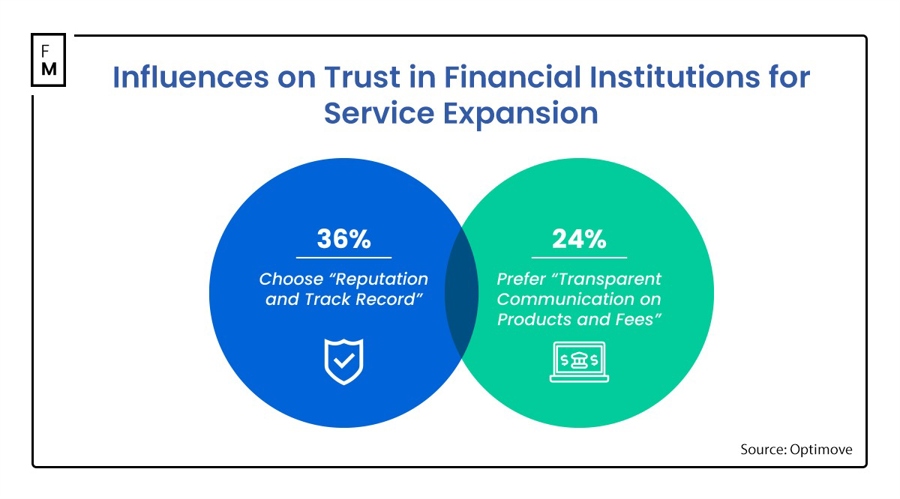Fintech
“60% of Clients Don’t Trust Financial Institutions”: Fintech’s Customer-Centric Shift

In any business, especially
financial services, if you can get a customer to use more services, it reduces
churn. Of course, the starting point in financial services is that there is trust
between the provider and the client. With trust, a client can be open to other
services.
With that said, a research by Optimove revealed
that customers have limited trust in financial advisors for multiple financial
needs. The survey of 260 US customers of financial institutions with household
incomes of $100,000-plus, revealed that just 40% of clients of these firms
implicitly trust their financial institution as the primary financial advisor
for multiple financial needs.
It underscores that 60% of respondents do not “totally
trust” their financial service provider as their primary financial advisor for
multiple financial needs.
Retaining customers is harder. In
today’s dynamic financial landscape, characterized by evolving customer
expectations and rapid technological advancements, the banking sector faces
unprecedented challenges in retaining customers. As people prove to be
inherently unpredictable, navigating this uncertainty requires innovative
strategies tailored to the modern fintech landscape.
Human behavior is complex,
influenced by subjective, emotional, and context-dependent factors. Traditional
banking strategies, often reliant on rigid frameworks, struggle to adapt to
this unpredictability. As a result, customer churn rates
can rise, exacerbated by increased competition and regulatory constraints.
Financial service
companies are at the forefront of revolutionizing the banking industry,
leveraging innovative technologies and customer-centric approaches to address
the challenges of unpredictability and churn.
The Role of Data and Emotional
Intelligence in Fintech
Fintech firms are revolutionizing
customer experiences through the strategic utilization of data analytics and
artificial intelligence. By leveraging these technologies, they can delve deep
into individual customer preferences and behaviors, paving the way for
personalized interactions. Tailoring services to meet the unique needs of each
customer fosters stronger connections and cultivates loyalty, thus enhancing
the overall customer experience.
Artificial Intelligence in Financial Technology
▶️ Source @FPrimeCapital
via @enricomolinari #⃣ #fintech #finserv #GenerativeAI #marketing #AI #govtech #ehealth #insurtech #banking #payments #neobanks #ChatGPT4 #innovation #leonardoai #enricomolinari @Nicochan33 @BetaMoroney… pic.twitter.com/QSl4M98sai— Enrico Molinari #CES2024 (@enricomolinari) April 29, 2024
Real-time engagement lies at the
heart of effective customer communication for fintech companies. Embracing
channels like chatbots, mobile apps, and social media platforms
enables prompt and efficient interaction with customers. Timely assistance and
support not only build trust but also play a crucial role in mitigating churn,
ensuring sustained customer satisfaction.
The adoption of predictive
analytics
Analytics
Analytics may be defined as the detection, analysis, and relay of consequential patterns in data. Analytics also seeks to explain or accurately reflect the relationship between data and effective decision making. In the trading space, analytics are applied in a predictive manner in an attempt to more accurately forecast the price. This predictive model of analytics generally involves the analysis of historical price patterns that are used in an attempt to determine certain price outcomes. Analyt
Analytics may be defined as the detection, analysis, and relay of consequential patterns in data. Analytics also seeks to explain or accurately reflect the relationship between data and effective decision making. In the trading space, analytics are applied in a predictive manner in an attempt to more accurately forecast the price. This predictive model of analytics generally involves the analysis of historical price patterns that are used in an attempt to determine certain price outcomes. Analyt
Read this Term empowers fintech firms to anticipate customer needs and offer
proactive solutions. By staying ahead of the curve, they enhance the customer
experience and nurture long-term relationships. Anticipatory services tailored
to individual preferences contribute significantly to customer satisfaction and
loyalty.
In addition to transactional
interactions, fintech companies are recognizing the importance of infusing
emotional intelligence into their communication strategies. Empathetic and
understanding communication resonates deeply with customers, strengthening their
emotional connection with the brand. This human touch adds depth to the
customer experience, fostering trust and loyalty in the long run.
Financial institutions are
increasingly integrating themselves into the lives of their customers by
harnessing the power of first-party data. For instance, Chase has launched
Chase Media Solutions, a digital
media business connecting millions of customers with brands they love.
Leveraging first-party financial data, this initiative enables personalized
offers and cashback opportunities for customers while providing tailored
experiences. This integration not only enhances customer engagement but also
forges stronger bonds between customers and the financial institution, creating
a win-win scenario for all parties involved.
Case Studies in Fintech Success
Numerous fintech firms have
already demonstrated the effectiveness of these strategies in improving
customer retention and reducing churn. Financial service companies have integrated
customer-led marketing platforms
as a cornerstone of their retention marketing
Marketing
Marketing is defined as the business process of identifying, anticipating and satisfying customers’ needs and wants.This is a crucial element of any operation or brokerage in the financial services space. Well-funded marketing campaigns are instrumental to the survival and longevity of these companies in an increasingly competitive industry.Within the forex space, marketers perform a wide range of functions to help procure, secure, or retain clients.In particular, newer forex brokers also have t
Marketing is defined as the business process of identifying, anticipating and satisfying customers’ needs and wants.This is a crucial element of any operation or brokerage in the financial services space. Well-funded marketing campaigns are instrumental to the survival and longevity of these companies in an increasingly competitive industry.Within the forex space, marketers perform a wide range of functions to help procure, secure, or retain clients.In particular, newer forex brokers also have t
Read this Term, empowering these brands to
deliver personalized, emotionally intelligent communications in real-time. By
micro-segmenting customers based on predicted behavior and value, these
platforms enable financial marketers to maximize engagement and lifetime value.
Customer Retention Strategies
As the banking industry continues
to evolve, fintech companies must remain agile and adaptive in their approach
to customer retention. By embracing innovation, leveraging data-driven
insights, and prioritizing customer-centricity, they can navigate the complexities
of human behavior and emerge as leaders in the ever-changing financial
landscape.
Tech and #fintech companies are challenging #banks to assess the role they play and how they must adapt.
Innovation and evolving customer demands have given rise to #embeddedfinance. However, banks do not want to be entirely cut out of the equation.Read the latest … pic.twitter.com/TwtEKK7SjJ
— Marcus Swanepoel (@Autism_Father) May 9, 2024
While people may be
unpredictable, fintech companies possess the tools and strategies necessary to
enhance customer retention and mitigate churn in the banking sector. By
prioritizing personalized experiences, real-time engagement, predictive analytics, and
emotional intelligence, they can build stronger relationships with customers
and thrive in an era of rapid change. It all starts with the customer, knowing
their needs and wants. As financial
institutions have access to each customer’s first-party data, they start with a
leg-up on competitors in continually earning the customer’s business.
In the end, financial
institutions should focus marketing on their track record when looking to
cross-sell products. The aforementioned research
revealed: When asked about the factors that influence respondents’ level of
trust in their financial institution when considering purchasing additional
services, the top choice was “Reputation and track record,” selected by 36% of
respondents, followed by “transparent communication about products and fees”
noted by 24%.
In any business, especially
financial services, if you can get a customer to use more services, it reduces
churn. Of course, the starting point in financial services is that there is trust
between the provider and the client. With trust, a client can be open to other
services.
With that said, a research by Optimove revealed
that customers have limited trust in financial advisors for multiple financial
needs. The survey of 260 US customers of financial institutions with household
incomes of $100,000-plus, revealed that just 40% of clients of these firms
implicitly trust their financial institution as the primary financial advisor
for multiple financial needs.
It underscores that 60% of respondents do not “totally
trust” their financial service provider as their primary financial advisor for
multiple financial needs.
Retaining customers is harder. In
today’s dynamic financial landscape, characterized by evolving customer
expectations and rapid technological advancements, the banking sector faces
unprecedented challenges in retaining customers. As people prove to be
inherently unpredictable, navigating this uncertainty requires innovative
strategies tailored to the modern fintech landscape.
Human behavior is complex,
influenced by subjective, emotional, and context-dependent factors. Traditional
banking strategies, often reliant on rigid frameworks, struggle to adapt to
this unpredictability. As a result, customer churn rates
can rise, exacerbated by increased competition and regulatory constraints.
Financial service
companies are at the forefront of revolutionizing the banking industry,
leveraging innovative technologies and customer-centric approaches to address
the challenges of unpredictability and churn.
The Role of Data and Emotional
Intelligence in Fintech
Fintech firms are revolutionizing
customer experiences through the strategic utilization of data analytics and
artificial intelligence. By leveraging these technologies, they can delve deep
into individual customer preferences and behaviors, paving the way for
personalized interactions. Tailoring services to meet the unique needs of each
customer fosters stronger connections and cultivates loyalty, thus enhancing
the overall customer experience.
Artificial Intelligence in Financial Technology
▶️ Source @FPrimeCapital
via @enricomolinari #⃣ #fintech #finserv #GenerativeAI #marketing #AI #govtech #ehealth #insurtech #banking #payments #neobanks #ChatGPT4 #innovation #leonardoai #enricomolinari @Nicochan33 @BetaMoroney… pic.twitter.com/QSl4M98sai— Enrico Molinari #CES2024 (@enricomolinari) April 29, 2024
Real-time engagement lies at the
heart of effective customer communication for fintech companies. Embracing
channels like chatbots, mobile apps, and social media platforms
enables prompt and efficient interaction with customers. Timely assistance and
support not only build trust but also play a crucial role in mitigating churn,
ensuring sustained customer satisfaction.
The adoption of predictive
analytics
Analytics
Analytics may be defined as the detection, analysis, and relay of consequential patterns in data. Analytics also seeks to explain or accurately reflect the relationship between data and effective decision making. In the trading space, analytics are applied in a predictive manner in an attempt to more accurately forecast the price. This predictive model of analytics generally involves the analysis of historical price patterns that are used in an attempt to determine certain price outcomes. Analyt
Analytics may be defined as the detection, analysis, and relay of consequential patterns in data. Analytics also seeks to explain or accurately reflect the relationship between data and effective decision making. In the trading space, analytics are applied in a predictive manner in an attempt to more accurately forecast the price. This predictive model of analytics generally involves the analysis of historical price patterns that are used in an attempt to determine certain price outcomes. Analyt
Read this Term empowers fintech firms to anticipate customer needs and offer
proactive solutions. By staying ahead of the curve, they enhance the customer
experience and nurture long-term relationships. Anticipatory services tailored
to individual preferences contribute significantly to customer satisfaction and
loyalty.
In addition to transactional
interactions, fintech companies are recognizing the importance of infusing
emotional intelligence into their communication strategies. Empathetic and
understanding communication resonates deeply with customers, strengthening their
emotional connection with the brand. This human touch adds depth to the
customer experience, fostering trust and loyalty in the long run.
Financial institutions are
increasingly integrating themselves into the lives of their customers by
harnessing the power of first-party data. For instance, Chase has launched
Chase Media Solutions, a digital
media business connecting millions of customers with brands they love.
Leveraging first-party financial data, this initiative enables personalized
offers and cashback opportunities for customers while providing tailored
experiences. This integration not only enhances customer engagement but also
forges stronger bonds between customers and the financial institution, creating
a win-win scenario for all parties involved.
Case Studies in Fintech Success
Numerous fintech firms have
already demonstrated the effectiveness of these strategies in improving
customer retention and reducing churn. Financial service companies have integrated
customer-led marketing platforms
as a cornerstone of their retention marketing
Marketing
Marketing is defined as the business process of identifying, anticipating and satisfying customers’ needs and wants.This is a crucial element of any operation or brokerage in the financial services space. Well-funded marketing campaigns are instrumental to the survival and longevity of these companies in an increasingly competitive industry.Within the forex space, marketers perform a wide range of functions to help procure, secure, or retain clients.In particular, newer forex brokers also have t
Marketing is defined as the business process of identifying, anticipating and satisfying customers’ needs and wants.This is a crucial element of any operation or brokerage in the financial services space. Well-funded marketing campaigns are instrumental to the survival and longevity of these companies in an increasingly competitive industry.Within the forex space, marketers perform a wide range of functions to help procure, secure, or retain clients.In particular, newer forex brokers also have t
Read this Term, empowering these brands to
deliver personalized, emotionally intelligent communications in real-time. By
micro-segmenting customers based on predicted behavior and value, these
platforms enable financial marketers to maximize engagement and lifetime value.
Customer Retention Strategies
As the banking industry continues
to evolve, fintech companies must remain agile and adaptive in their approach
to customer retention. By embracing innovation, leveraging data-driven
insights, and prioritizing customer-centricity, they can navigate the complexities
of human behavior and emerge as leaders in the ever-changing financial
landscape.
Tech and #fintech companies are challenging #banks to assess the role they play and how they must adapt.
Innovation and evolving customer demands have given rise to #embeddedfinance. However, banks do not want to be entirely cut out of the equation.Read the latest … pic.twitter.com/TwtEKK7SjJ
— Marcus Swanepoel (@Autism_Father) May 9, 2024
While people may be
unpredictable, fintech companies possess the tools and strategies necessary to
enhance customer retention and mitigate churn in the banking sector. By
prioritizing personalized experiences, real-time engagement, predictive analytics, and
emotional intelligence, they can build stronger relationships with customers
and thrive in an era of rapid change. It all starts with the customer, knowing
their needs and wants. As financial
institutions have access to each customer’s first-party data, they start with a
leg-up on competitors in continually earning the customer’s business.
In the end, financial
institutions should focus marketing on their track record when looking to
cross-sell products. The aforementioned research
revealed: When asked about the factors that influence respondents’ level of
trust in their financial institution when considering purchasing additional
services, the top choice was “Reputation and track record,” selected by 36% of
respondents, followed by “transparent communication about products and fees”
noted by 24%.
Fintech
Lloyds and Nationwide invest in Scottish fintech AI Aveni

Lloyds Banking Group and Nationwide have joined an £11m Series A funding round in Scottish artificial intelligence fintech Aveni.
The investment is led by Puma Private Equity with additional participation from Par Equity.
Aveni creates AI products specifically designed to streamline workflows in the financial services industry by analyzing documents and meetings across a range of operational functions, with a focus on financial advisory services and consumer compliance.
The cash injection will help fund the development of a new product, FinLLM, a large-scale language model created specifically for the financial sector in partnership with Lloyds and Nationwide.
Joseph Twigg, CEO of Aveni, explains: “The financial services industry doesn’t need AI models that can quote Shakespeare, it needs AI models that offer transparency, trust and, most importantly, fairness. The way to achieve this is to develop small, highly tuned language models, trained on financial services data, vetted by financial services experts for specific financial services use cases.
“FinLLM’s goal is to set a new standard for the controlled, responsible and ethical adoption of generative AI, outperforming all other generic models in our selected financial services use cases.”
Robin Scher, head of fintech investment at Lloyds Banking Group, says the development programme offers a “massive opportunity” for the financial services industry by streamlining operations and improving customer experience.
“We look forward to supporting Aveni’s growth as we invest in their vision of developing FinLLM together with partners. Our collaboration aims to establish Aveni as a forerunner in AI adoption in the industry, while maintaining a focus on responsible use and customer centricity,” he said.
Fintech
Fairexpay: Risk consultancy White Matter Advisory acquires 90% stake in fintech Fairexpay

Treasury Risk Consulting Firm White Matter Alert On Monday he announced the acquisition of a 90% stake in the fintech startup Fair payment for an undisclosed amount. The acquisition will help White Matter Advisory expand its portfolio in the area of cross-border remittance and fundraising services, a statement said. White Matter Advisory, which operates under the name SaveDesk (White Matter Advisory India Pvt Ltd), is engaged in the treasury risk advisory business. It oversees funds under management (FUM) totaling $8 billion, offering advisory services to a wide range of clients.
Improve your technology skills with high-value skills courses
| IIT Delhi | Data Science and Machine Learning Certificate Program | Visit |
| Indian School of Economics | ISB Product Management | Visit |
| MIT xPRO | MIT Technology Leadership and Innovation | Visit |
White Matter Advisory, based in Bangalore, helps companies navigate the complexities of treasury and risk management.
Fairexpay, authorised by the Reserve Bank of India (RBI) under Cohort 2 of the Liberalised Remittance Scheme (LRS) Regulatory Sandbox, boasts features such as best-in-class exchange rates, 24-hour processing times and full security compliance.
“With this acquisition, White Matter Advisory will leverage Fairexpay’s advanced technology platform and regulatory approvals to enhance its services to its clients,” the release reads.
The integration of Fairexpay’s capabilities should provide White Matter Advisory with a competitive advantage in the cross-border remittance and fundraising market, he added.
The release also states that by integrating Fairexpay’s advanced technology, White Matter Advisory aims to offer seamless and convenient cross-border payment solutions, providing customers with secure options for international money transfers.
Fintech
Rakuten Delays FinTech Business Reorganization to 2025

Rakuten (Japan:4755) has released an update.
Rakuten Group, Inc. and Rakuten Bank, Ltd. announced a delay in the reorganization of Rakuten’s FinTech Business, moving the target date from October 2024 to January 2025. The delay is to allow for a more comprehensive review, taking into account regulatory, shareholder interests and the group’s optimal structure for growth. There are no anticipated changes to Rakuten Bank’s reorganization objectives, structure or listing status outside of the revised timeline.
For more insights on JP:4755 stock, check out TipRanks Stock Analysis Page.
Fintech
White Matter Advisory Acquires 90% Stake in Fintech Startup Fairexpay

You are reading Entrepreneur India, an international franchise of Entrepreneur Media.
White Matter Advisory, which operates under the name SaveDesk in India, has announced that it is acquiring a 90% stake in fintech startup Fairexpay for an undisclosed amount.
This strategic move aims to strengthen White Matter Advisory’s portfolio in cross-border remittance and fundraising services.
By integrating Fairexpay’s advanced technology, White Matter Advisory aims to offer seamless and convenient cross-border payment solutions, providing customers with secure options for international money transfers.
White Matter Advisory, known for its treasury risk advisory services, manages funds under management (FUM) totaling USD 8 billion.
Founded by Bhaskar Saravana, Saurabh Jain, Kranthi Reddy and Piuesh Daga, White Matter Advisory helps companies effectively manage the complexities of treasury and risk management.
The SaveDesk platform offering includes a SaaS-based FX market data platform with real-time feeds for over 100 currencies, bank cost optimization services, customized treasury risk management solutions, and compliance guidance for the Foreign Exchange Management Act (FEMA) and other trade regulations.
Fairexpay is a global aggregation platform offering competitive currency exchange rates from numerous exchange partners worldwide. Catering to both private and corporate customers, Fairexpay provides seamless money transfer solutions for education, travel and immigration, as well as simplifying cross-border payments via API and white-label solutions for businesses. Key features include competitive currency exchange rates, 24-hour processing times, extensive currency coverage of over 30 currencies in more than 200 countries, and secure, RBI-compliant transactions.
-

 DeFi11 months ago
DeFi11 months agoSwitchboard Revolutionizes DeFi with New Oracle Aggregator
-

 News11 months ago
News11 months agoLatest Business News Live Updates Today, July 11, 2024
-

 DeFi11 months ago
DeFi11 months agoIs Zypto Wallet a Reliable Choice for DeFi Users?
-

 DeFi1 year ago
DeFi1 year ago👀 Lido prepares its response to the recovery boom
-

 Fintech11 months ago
Fintech11 months agoFinTech LIVE New York: Mastercard and the Power of Partnership
-

 DeFi11 months ago
DeFi11 months agoEthena downplays danger of letting traders use USDe to back risky bets – DL News
-

 Fintech1 year ago
Fintech1 year ago121 Top Fintech Companies & Startups To Know In 2024
-

 Fintech1 year ago
Fintech1 year agoFintech unicorn Zeta launches credit as a UPI-linked service for banks
-

 News1 year ago
News1 year agoSalesforce Q1 2025 Earnings Report (CRM)
-

 ETFs1 year ago
ETFs1 year agoGold ETFs see first outing after March 2023 at ₹396 cr on profit booking
-

 Videos1 year ago
Videos1 year ago“We will enter the ‘banana zone’ in 2 WEEKS! Cryptocurrency prices will quadruple!” – Raoul Pal
-

 Videos1 year ago
Videos1 year ago“BlackRock HAS UNLEASHED a massive multi-trillion monster” – Lyn Alden and Eric Balchunas

















